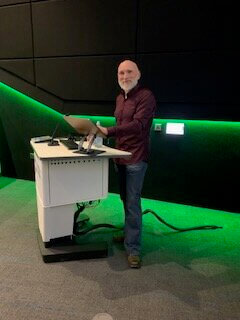Surf and Sentimentality: An Exploration of Big Wednesday with Dr Mark McKenna
Written by Eleanor Tait on 7th December 2024
More than 40 years ago, the New Hollywood cinema movement was surging forward, churning out classics of such magnitude as Apocalypse Now and Dirty Harry hitting the silver screen.
Behind some of the most famous lines and sequences of these films was screenwriter and director, John Milius. Whilst the likes of Francis Ford Coppola, Stephen Spielberg, and George Lucas have become household names, Milius has largely faded into obscurity, shrouded in controversy.
While Milius’ pro-firearm philosophies saturated many of the films he had a hand in, one movie, Big Wednesday, strayed from his usual repertoire of action adventures and thrillers. In his new book, Dr Mark McKenna, Associate Professor of Film and Media Industries at Staffordshire University, is keen to unveil a sentimental side to Milius’ creations.
Big Wednesday: Lamenting Lost Youth in the New Hollywood dissects male friendships in Milius’ 1978 coming-of-age surf drama and reappraises a movie which was initially washed under as a box office flop, but is now riding a wave of critical appreciation.
Talking to me on the day of his book launch in his home city of Sunderland, Mark shared his fascination for the film.
“Big Wednesday is an anomaly in Milius’ career. He’s seen as, and he is this, Right wing, Republican, controversial figure who insisted on being paid in guns. He’s deliberately provocative, always kind of extreme.
“Big Wednesday is not like that at all. It’s a really quite gently, sentimental, male melodrama about three friends – we find them in the story in 1962 and it follows them through their lives over the next 30 years.
“I first saw it on a TV programme called Moviedrome which was hosted by the director Alex Cox. I think I was only 12 at the time, and it just stayed with me forever. So, when the opportunity came up to write a book about youth cultures in cinema, this sprung to mind, because it’s not the most obvious kind of youth movie.”
The film follows three young Californian surfers, Matt, Jack, and Leroy, and reflects on the significant events of their lives and loss of the youth which bound them together.
In the 1970s, its critical reception was not particularly positive, and it sold few tickets in cinemas – but why?
“I think because Milius had a reputation, even at that point, for a particular kind of film – and this was just not that kind of film,” Mark explains.
“People who would have gravitated towards his work didn’t find anything they would have been interested in here, and the people who wouldn’t go near his work, who may have found something interesting here, didn’t go near it, because it was a Milius project.
“It didn’t help that it was badged as a surfing film as well – which it is, but it’s more than that. It really is an overtly sentimental melodrama, surfing’s just the backdrop.”

Dr Mark McKenna presents his book Big Wednesday: Lamenting Lost Youth in the New Hollywood (Credit: Barbara Sadler)
It also seems that social stigmas around expressions of male emotion might have caused the movie to suffer on its initial release, as Mark continues.
“Particularly for men, and men in the ‘70s, melodrama was seen as a ‘women’s’ genre.
“You’re fighting against a culture and how we understand film and how films are marketed and sold – but that changes and that’s why the film starts to get reappraised.
“Throughout the ‘80s, you start to get films like Field of Dreams and Dead Poets Society, where men are a bit more in touch with their emotions than they had been.”
This is an important point for Mark, as with central themes of male friendship, youth, and loss played out across the film, his exploration of these has made his book a particularly poignant project.
“I didn’t know this when I started writing the book, but as I wrote the book I lost one of my closest friends to suicide.
“That really kind of knocked me for six. I was writing this book about friendship, or at least about a film about friendship, and I lost one of my oldest friends. It took me a long time to get my head a round that and get over that.
“It must have been about halfway through that process, I lost another, and then just towards the end, I lost another.
“This is really incredibly unusual for an academic book to have this personal feeling behind it, but the book has become a marker of my own life and what’s been lost and gained over the decades we’ve known each other. It’s become this odd marker that it wasn’t meant to be going on, because I just loved the film and what it represented.”
Mark has brought his book launch to Sunderland, firstly, he laughs, to be rather more appropriately by the coast rather than in landlocked Staffordshire, but more importantly so the families of his lost friends can be present as he dedicates the book to their memories.
Rounding off, I ask how valuable exploring complex emotions through creative practices is.
“We gravitate towards this sort of stuff. We look for reflections of what we feel, and film can be incredibly useful for that, to see it recognised in other people.”
Big Wednesday: Lamenting Lost Youth in the New Hollywood is available to purchase here.







